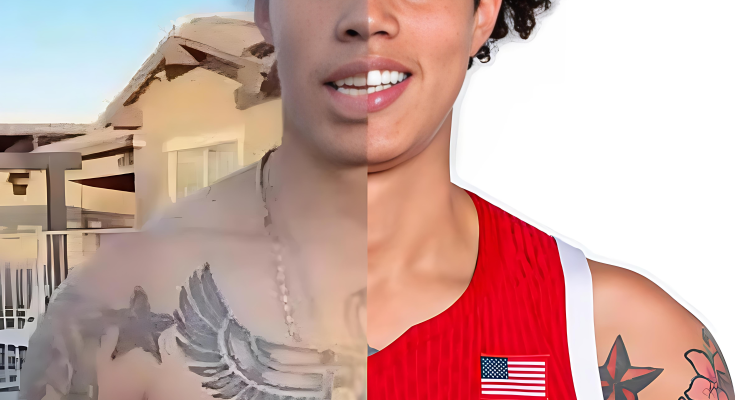In a controversial and groundbreaking move, the WNBA has announced that all players will now be required to undergo mandatory sex testing as part of the league’s updated eligibility standards. The announcement has set the basketball world ablaze, but what has truly shocked fans is the specific mention of Brittney Griner, the WNBA star who has been temporarily banned from competing in the women’s division until she undergoes the testing.

This move has caused an uproar, with fans and critics alike questioning the implications it has for gender equality, fairness, and inclusivity in professional sports. But the controversy doesn’t end there. The announcement also brought up heated discussions about Griner’s appearance and behavior, with some speculating that her “hidden male hormones” could be influencing her physical appearance and personality in ways that no one saw coming.
The WNBA, which has long been a symbol of women’s empowerment and athletic excellence, is now at the center of an ethical and social storm. The league’s decision to enforce sex testing is seen by many as a step toward ensuring fairness, but it’s also been met with widespread accusations of discrimination and overreach. Critics argue that such measures could open the door for gender policing in a sport that should be embracing diversity and inclusion.
At the heart of the controversy is Brittney Griner, a towering figure in the WNBA, known not just for her athletic prowess but also for her outspoken advocacy on issues of social justice. Griner has long been an inspiration to many, especially for the LGBTQ+ community, but now her status has been called into question by the league’s latest ruling. For Griner, the news comes as a huge blow, not just professionally but personally, as she has always been seen as one of the most dominant and powerful forces in women’s basketball.
While the WNBA’s decision to ban Griner from playing until she undergoes testing has sparked significant debate, what has truly divided fans is the speculation surrounding her physical changes. Over recent months, many have pointed to Griner’s increasingly masculine features, noting her stronger physique, deepened voice, and more masculine demeanor as potential signs that she may have higher levels of male hormones than typically seen in women’s sports. Some even argue that her appearance and behavior have become so “manly” that she now mirrors characteristics more commonly associated with male athletes than female ones.
The debate has reached a fever pitch, with some fans questioning whether Griner’s changes could be the result of hormone treatments, while others argue that her transformation is simply the result of intense athletic training and personal growth. These discussions have led to polarizing opinions on the topic of gender identity and performance in sports.
Transgender athletes, particularly those who have transitioned from male to female, have also weighed in on the controversy, claiming that Griner’s situation mirrors their own struggles. Many feel a sense of solidarity with Griner, seeing her changes in physical appearance and character as a reflection of the transgender experience, where societal expectations of femininity are constantly challenged. Some argue that Griner’s experience is a reminder of the intersectionality within sports, where race, gender, and identity often collide.
On the other hand, fans of women’s sports have expressed concerns about fairness and whether Griner’s physical transformation could give her an unfair advantage over other female athletes. The WNBA’s sex testing policy is being portrayed by many as an attempt to level the playing field and ensure that players in the women’s division are competing based on the biological sex they were assigned at birth. However, this raises even further concerns about how the league will handle transgender athletes and those who may fall outside traditional gender norms.
The WNBA’s new policy has brought the issue of gender identity in sports to the forefront, sparking heated conversations in locker rooms, social media, and news outlets. Fans are split, with some saying that Griner’s changes are simply part of her evolution as an athlete, while others insist that her “masculine traits” disqualify her from competing in women’s sports.

What is the WNBA’s stance moving forward? Will they allow Griner to continue playing after she undergoes testing, or will this mark the beginnin



